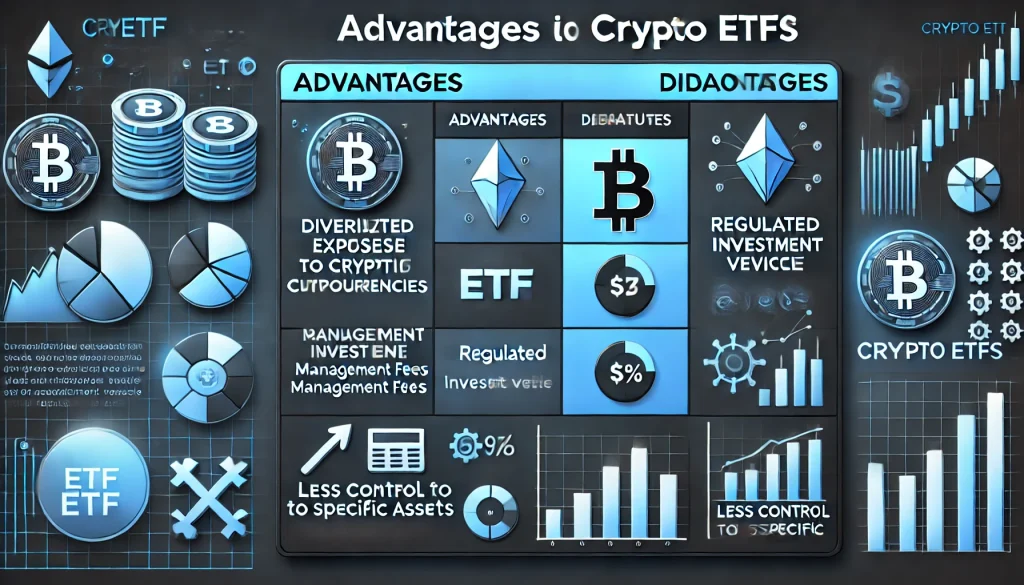
Crypto ETFs (Exchange-Traded Funds) are a relatively new financial product that allows investors to gain exposure to cryptocurrencies without directly owning them. With the increasing popularity of cryptocurrencies like Bitcoin and Ethereum, Crypto ETFs offer an easier, more regulated way to invest. Understanding how it work and their potential risks is essential for investors looking to enter the crypto market. This review will explore the advantages, disadvantages, and overall performance to help you decide whether they’re worth adding to your portfolio.
Overview
A Crypto ETF, or cryptocurrency exchange-traded fund, is a financial product that tracks the value of one or more digital assets like Bitcoin, Ethereum, or other cryptocurrencies. Instead of directly buying and holding cryptocurrency, Crypto ETFs let investors purchase shares of the fund, which are traded on traditional stock exchanges. This approach offers easier access to the crypto market for those who prefer a regulated, familiar structure. With it, investors don’t need to handle wallets or private keys, and they can avoid some of the complexities of crypto trading. ETFs make it easier to gain exposure to the cryptocurrency market while benefiting from traditional investment mechanisms like liquidity, security, and government regulation.
Crypto ETFs have become increasingly popular due to their combination of crypto market exposure with the regulated nature of stock market investments. The rise of ETFs reflects growing interest in cryptocurrencies while catering to more traditional investors who are hesitant to manage digital currencies directly. They offer a middle ground for those looking to take advantage of the booming crypto sector without diving into the complex world of cryptocurrency exchanges.
Pros and Cons

Pros
One of the biggest advantages of Crypto ETFs is how they simplify access to the cryptocurrency market. For traditional investors, these ETFs eliminate the need to deal with crypto wallets and exchanges, making the investment process more straightforward. Since ETFs are regulated, they also provide an additional layer of security, which can be reassuring in a market known for its volatility and unregulated nature. Investors can buy and sell shares through established stock exchanges, making the process as simple as trading stocks. This ease of use attracts a wide range of investors, from crypto novices to those who prefer regulated financial products.
Cons
On the downside, Crypto ETFs often come with management fees that can reduce overall returns, especially in volatile markets where cryptocurrencies experience sharp ups and downs. Additionally, the volatility of cryptocurrencies is still a significant concern for investors, even within the regulated structure of an ETF. It offer fewer diversification options compared to traditional ETFs or direct cryptocurrency investments. Some investors believe that the ETF structure diminishes key cryptocurrency advantages, such as decentralization and independence from financial institutions.
| Pros | Cons |
|---|---|
| Easier access for investors | Management fees reduce potential returns |
| Regulated for added security | Subject to high volatility of crypto |
| No need for managing crypto wallets | Fewer ETF options available |
In-Depth Analysis
Performance

Crypto ETFs have performed relatively well in the context of cryptocurrency’s broader market fluctuations. These ETFs are designed to track the performance of one or more cryptocurrencies, most commonly Bitcoin or Ethereum. When the value of the underlying cryptocurrency rises, the ETF mirrors this growth. However, they are still subject to sharp declines if the cryptocurrency market experiences volatility. The advantage is that unlike direct crypto investments, it is are traded on traditional stock exchanges, offering easier access and liquidity. This makes them appealing to investors who want to avoid the complexities of managing digital wallets or dealing with cryptocurrency exchanges. Some Crypto also provide a diversified exposure to multiple digital assets, reducing risk.
Usability
Crypto ETFs are straightforward to use, especially for those already familiar with stock market investments. Investors can buy and sell shares through their brokerage accounts, similar to trading stocks. This ease of use is one of the key reasons why many traditional investors are drawn to Crypto ETFs. There’s no need to worry about securing private keys, protecting wallets, or navigating volatile crypto exchanges. Additionally, Crypto ETFs benefit from being part of a regulated market, which reassures more cautious investors. In the U.S., the Securities and Exchange Commission (SEC) regulates ETFs, which adds an extra layer of security that cryptocurrency exchanges do not provide.
Risks
Despite their ease of use, Crypto ETFs are still risky due to the nature of the underlying assets. Cryptocurrencies are notoriously volatile, and the price can swing dramatically in a short period of time. The fund regulates itself, but the crypto market it tracks remains unregulated, exposing investors to sudden value drops. Another drawback involves the management fees associated with ETFs. While these fees may seem small, they can reduce overall returns, especially in markets with high volatility. Therefore, it might not be suitable for every investor, particularly those looking for more stable returns.
Comparison with Other Investment Options
Crypto ETFs vs. Direct Cryptocurrency Investments: Comparing it to direct investments in Bitcoin or Ethereum highlights the key difference in how assets are managed. With direct crypto ownership, investors must handle the security of their digital wallets and bear the full risk of holding the cryptocurrency. On the other hand, Crypto ETFs simplify this process by offering exposure to the same digital assets without requiring users to hold them directly. This makes ETFs a safer and more convenient option, but at the cost of management fees.
Crypto ETFs vs. Traditional ETFs: Unlike traditional ETFs that track indexes like the S&P 500, it follow the volatile cryptocurrency market. While traditional ETFs offer diversification and typically lower risk, it come with higher risk but the potential for rapid gains if the cryptocurrency market spikes. This makes Crypto ETFs more attractive to risk-tolerant investors looking for high growth potential, but less suitable for conservative investors who prioritize stability.
Compared to other crypto-related products like crypto trusts, Crypto ETFs offer more liquidity. Trusts like the Grayscale Bitcoin Trust (GBTC) have been popular alternatives, but they trade at premiums or discounts relative to the actual value of the cryptocurrency. In contrast, it offer more accurate pricing and are easier to trade, making them a better option for those seeking more fluid market involvement.
Conclusion
Crypto ETFs offer an accessible and regulated way to invest in cryptocurrencies without directly managing them. They simplify entering the crypto market and help investors interested in crypto who may not feel comfortable handling digital wallets or exchanges. However, like any crypto investment, they come with high risks due to volatility and can include additional fees. For investors willing to accept these risks, it can be a smart choice for diversifying their portfolios.
Rating (out of 5 stars)
4/5 – Crypto ETFs offer easy access and regulation but are still tied to the volatility of the cryptocurrency market.
FAQ
What is a Crypto ETF?
A Crypto ETF is an exchange-traded fund that tracks the value of one or more cryptocurrencies, allowing investors to gain exposure to the crypto market without directly owning digital assets.
Are Crypto ETFs regulated?
Yes, Crypto ETFs are regulated by financial authorities, which makes them a more secure option compared to directly investing in cryptocurrencies.
What are the risks of investing in Crypto ETFs?
The main risks include high volatility due to the nature of the cryptocurrency market and management fees that may reduce overall returns.
Resources
- Investopedia. Pros and Cons of Crypto ETFs
- CoinDesk. What’s Next for Crypto?
- CoinsPaid. The ETF Effect
- Analytics Insight. Bitcoin ETFs: Understanding the Impact on the Crypto Market
- Kryll. Understanding Bitcoin ETFs
